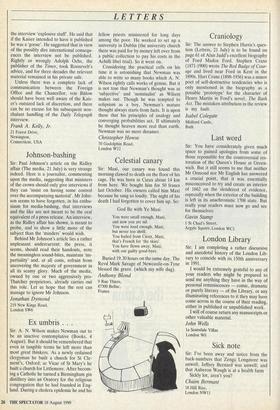Ex umbris . . .
Sir: A. N. Wilson makes Newman out to be an inactive contemplative (Books, 4 August). But it should be remembered that even in tangible terms he left more than most great thinkers. As a newly ordained clergyman he built a church for St Cle- ment's, Oxford; as Vicar of St Mary's he built a church for Littlemore. After becom- ing a Catholic he turned a Birmingham gin distillery into an Oratory for the religious congregation that he had founded in Eng- land. During a cholera epidemic he and his
fellow priests ministered for long days among the poor. He worked to set up a university in Dublin (the university church there was paid for by money left over from a public collection to pay his costs in the Achilli libel trial). So it went on.
Considering the practical calls on his time it is astonishing that Newman was able to write so many books which A. N. Wilson rightly calls works of genius. But it is not true that Newman's thought was as 'subjective' and 'nominalist' as Wilson makes out. Though he was tempted to solipsism as a boy, Newman's mature thought always starts from facts. It is upon these that his principles of analogy and converging probabilities act. If ultimately he thought heaven more real than earth, Newman was no mere dreamer.
Christopher Howse
70 Godolphin Road, London W12


























































 Previous page
Previous page